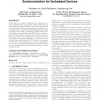Free Online Productivity Tools
i2Speak
i2Symbol
i2OCR
iTex2Img
iWeb2Print
iWeb2Shot
i2Type
iPdf2Split
iPdf2Merge
i2Bopomofo
i2Arabic
i2Style
i2Image
i2PDF
iLatex2Rtf
Sci2ools
112
click to vote
SAC
2009
ACM
2009
ACM
On scheduling soft real-time tasks with lock-free synchronization for embedded devices
In this paper, we consider minimizing the system-level energy consumption through dynamic voltage scaling for embedded devices, while a) allowing concurrent access to shared objects through lock-free synchronization b) meeting (m, k)constraint, and c) completing as many high importance tasks as possible. We present a scheduling algorithm called LockFree Utility accrual Algorithm (or MK-LfUA) to meet these goals. At offline stage, we statistically determine task execution time, and set the optimal CPU speed that will minimize system-level energy consumption. At run-time, the algorithm dynamically adjusts the CPU speed to compensate for slack time, while taking into account the speed transition overhead. Our simulation studies on the Intel PXA271 processor model illustrate MK-LfUA’s superiority over past work by 15-25%. Categories and Subject Descriptors D.4.7 [Operating Systems]: Organization and Design— Real-time systems and embedded systems; D.4.1 [Operating Systems]: Process Man...
Applied Computing | CPU Speed | Dynamic Voltage Scaling | SAC 2009 | System-level Energy Consumption |
| Added | 19 May 2010 |
| Updated | 19 May 2010 |
| Type | Conference |
| Year | 2009 |
| Where | SAC |
| Authors | Shouwen Lai, Binoy Ravindran, Hyeonjoong Cho |
Comments (0)

